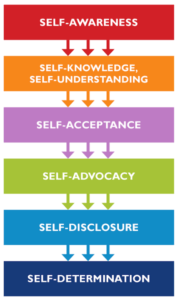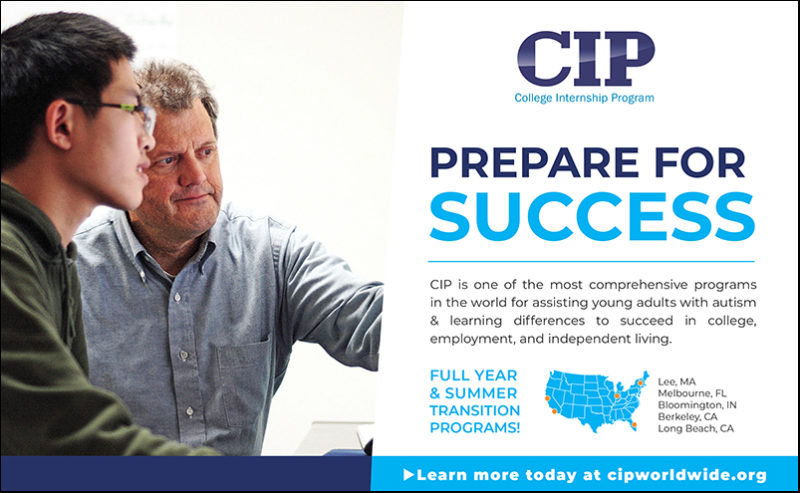
Figure 1.1 Continuum of Growth
The journey to adulthood can be daunting and overwhelming for anyone, especially for young adults with autism spectrum disorders (ASD). As parents, friends, professionals, and members of the community, we play a vital role in empowering our young adults to start their journey to becoming self-determined adults. Young adults who are self-determined are more likely to succeed as adults and transition to living happy, independent and productive lives. This journey starts with equipping our young adults with the knowledge, skills, and attitude they will need to navigate their own journey to independence.
Self-determination refers to the idea that individuals can control their own destiny. Field, Martin, Miller, Ward, and Wehmeyer (1998) describes self-determination as possessing “a combination of skills, knowledge, and beliefs that enable a person to engage in goal-directed, self-regulated, autonomous behavior….” Examples of self-determination include identifying and developing long-term and short-term goals, whether educational, vocational or living skills. A self-determined young adult must foster key essential skills to successfully navigate resources, support and their community to achieve their goals. For self-determination to become a reality, supporters must be committed to “letting go” and instead empower their young adults to make decisions for themselves.
Supporters of young adults with ASD often seek external support to assist with the letting go process. Transition programs such as the College Internship Program (CIP), assist young adults to strive towards self-determination by empowering them to set goals, make choices and practice self-advocacy skills. CIP utilizes a person-centered planning (PCP) approach to assist young adults to develop meaningful life goals that highlight their dreams, strengths, talents, and capabilities. Identifying goals provides a path for young adults to track their progress and make adjustments as needed. Self-determination becomes a reality when young adults identify a goal and begin their progression through the “continuum of growth.” For this tool to be effective, a young adult must have the desire and motivation to work towards independence.
Young adults with ASD will eventually grow up to become adults with ASD. This is why the journey to self-determination must start with self. Implementing the “Continuum of Growth” (Figure 1.1) model guides young adults to take the necessary steps to attain self-determination. Young adults will begin to gain confidence through self-awareness, self-understanding, and self-acceptance as they work towards achieving their identified goals. The journey starts with self-awareness. McManmon (2016) states that “young people need to be reminded that they are separate individuals with unique personalities.” Young adults must be aware of their own unique strengths, limitations, talents, and gifts, in order to fully understand how their diagnosis may affect their journey to accomplish their future goals.
The construct of self-awareness serves as the foundational step to understanding one’s own attitude, abilities, and limitations, all of which are essential in decision making and problem-solving. Self-awareness starts with young adults identifying their own character, feelings, motives, and desires ultimately achieving self-acceptance. According to McManmon (2016), young adults can achieve self-understanding through self-acceptance by, “using what they are learning or have learned, instead of comparing themselves with others or trying to be people they are not.” Self-understanding focuses on young adults knowing themselves as individuals, including their actions and reactions. This includes making and learning from their decisions. Self-understanding also includes understanding one’s needs and differences and accepting those differences. This understanding and acceptance allows one to develop their own strategies to problem solve and make decisions. Young adults must embrace and accept their own unique gifts, talents, and limitations to be able to successfully navigate their future experiences.
The journey to self-determination includes empowering young adults to develop and actively take the initiative to pursue their life goals. This process often involves self-advocacy and self-disclosure. Young adults must be able to represent their own views or interests which may require them to reveal information about themselves. By recognizing one’s unique talents, gifts and limitations, young adults will be more confident disclosing and advocating to attain the necessary support and resources needed to achieve their goals.
The goal is for young adults with ASD to progress through the continuum to the level that they are able to independently self-disclose and be self-determined to reach their full potential. Self-determination embraces freedom of choice and free will, without external control. For young adults to make it to this final step in the “Continuum of Growth” they must be able to demonstrate the following skills:
- Identify, develop and evaluate their own short-term and long-term goals
- Have the motivation to work towards achieving their identified goals
- Promote self-awareness and self-understanding
- Accept individual differences such as talents, strengths, and limitations
- Identify and advocate for resources and support as needed
- Utilize problem-solving and decision-making skills
- Self-represent and appropriately disclose disability when needed
The journey to self-determination can be rocky for anyone, not just young adults with a diagnosis. Each year, CIP supports over 150 young adults with ASD and other learning differences as they navigate their own path to living self-determined lives. These young adults face the challenges of progressing through the “Continuum of Growth.” However, their dedication and motivation results in them achieving their goals.
If provided the right resources, opportunities, and support, young adults with ASD can exhibit self-determined behaviors. They can develop and achieve goals identified, including graduating from college, obtaining employment and even renting, or buying their own home. We all play a role in aiding our young adults as they take the journey to self-determination. Our role, as supporters, will always be to provide opportunities and empower them to progress through the “Continuum of Growth” as they strive to live their unique independent lives.
Pilar Page, MSW, is the Program Director at the College Internship Program (CIP) in Berkeley. CIP is a national transition program for young adults with autism, ADHD and other learning differences. For information about their five year-round and summer programs across the US, visit www.cipworldwide.org or call 877-566-9247.
References
ERIC Clearinghouse on Disabilities and Gifted Education Reston VA.
Field, S., Martin, J., Miller, R., Ward, M, & Wehmeyer, M. (1998). A practical guide for teaching self-determination. Reston, VA: Council for Exceptional Children.
https://www.autism.org/self-advocacy/
McManmon, M. P. (2016). Autism and learning differences: an active learning teaching toolkit. London: Jessica Kingsley Publishers.
Wehmeyer, M. (2002). Self-Determination and the Education of Students with Disabilities.




